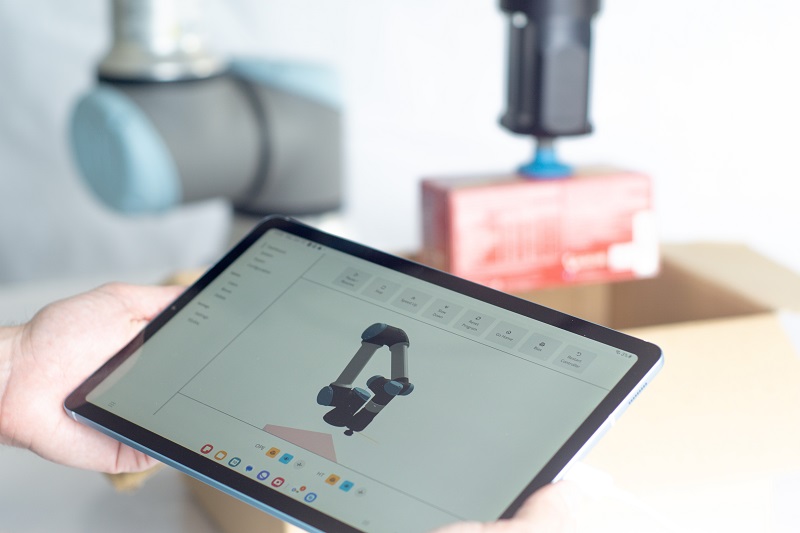It is in contact with robot installers for its first three pilot installations in factories in northern Greece and Germany
George works in a small factory in Macedonia as an unskilled worker and although he has no knowledge of robotics or programming, in a few seconds he will “teach” a robotic arm how to solve a completely new “problem”, namely how to place a range of biscuit packages in a carton with dimensions different from those normally used.
Product changes at the factory have been frequent in recent weeks, and normally, the robots would have to be reprogrammed each time – by writing code – for the new job, a process that could take days, with all that means in time and money. Not in this particular case though: By pressing a button and taking the robot… by the hand, George can show it the desired action and then have it perform it as many times as needed, without reprogramming and without further guidance ! It is not “blind” like most robotic arms, as it has 3D machine vision, while it is flexible, easy to use and intelligent, and can be taught in the same way that a student learns from his teacher.
How; Thanks to the innovative software, developed by a group of researchers from the Automation & Robotics Laboratory of the Aristotle University of Thessaloniki (AUTH), who founded one of the youngest spin-off companies of the institution, “Progressive Robotics”. The unskilled laborer George is a fictional person, but the possibilities described above are entirely real. The “newborn” spinoff was founded only in July 2023 by researchers Fotis Dimeas and Mario Kiato and professor Zoe Doulgeri. The solution he proposes allows people to show robots, very easily, how to perform packing and palletizing tasks using Artificial Intelligence and a low-cost camera, in just a few seconds, without programming.
The CEO of the company, Fotis Dimeas, who prepared his PhD on human-robot collaboration, explains to APEm that he always wanted to see the result of the research pass into the practice of the market and quickly realized that, because it is rather difficult to come. .. the market to you, you have to go to the market: “So, together with Mario, we left the researcher’s hat and put on the businessman’s hat. It’s stressful and difficult to wear that hat, but at the same time it’s extremely exciting,” he says, describing the experience of the last few months.
The technology that allows robots to become smarter was developed by the team as part of the “ProgHRC” research project, which started three years ago, at the AUTH’s Automation and Robotics Laboratory. In fact, the team’s business plan won fifth place in the 13th competition of the National Bank’s “NBG Seeds” program. Today the team has not only developed its Minimum Viable Product (MVP), not only filed a patent application for it, but is in contact with robot installers for its first three pilot installations in factories in northern Greece and Germany.
“By the end of 2024 we want to have completed the pilot applications so that our product can come to market. Our target is the markets of Europe. Greece is a pilot market for us, although we see that in recent years it is strongly developing and there is an increased need for robots” he points out and adds that the developers and installers themselves ask for such products, as they free them from routine work, freeing time for more creative pursuits.
The company’s product, which is estimated to achieve cost savings of 20%-30% compared to the traditional programming method and reduce installation time by seven to nine times, will be available in a special “kit”, which includes the software, camera, a tablet and whatever else is necessary, to be able to support with a wide range of robotic arms and make them smarter. Essentially, the product “snaps” onto a robotic arm, giving it capabilities it didn’t have before.
“Similar approaches to ours have already emerged from spin-off companies coming out of major US universities that tend to become ‘unicorns’ (ie start-ups that ‘catch’ a valuation of more than $1 billion). The most important difference in the approach of Progressive Robotics is the ease of use, which allows a human to automate complex tasks in a minimum of time and without the need for any expertise at all” notes Fotis and clarifies that “Progressive Robotics” (https:// progressiverobotics.ai/) recently presented its technology at “Automatica 2023” in Germany, one of the world’s most important robotics trade shows, implementing its strategy to enter the global market.
“Manufacturing engineers often say ‘when something works, you don’t mind,’ but with this solution even an unskilled worker can guide a robot to perform a completely different task perfectly, significantly increasing the competitiveness of the company using it, since the “dead” times are practically annihilated” concludes Fotis Dimeas.








